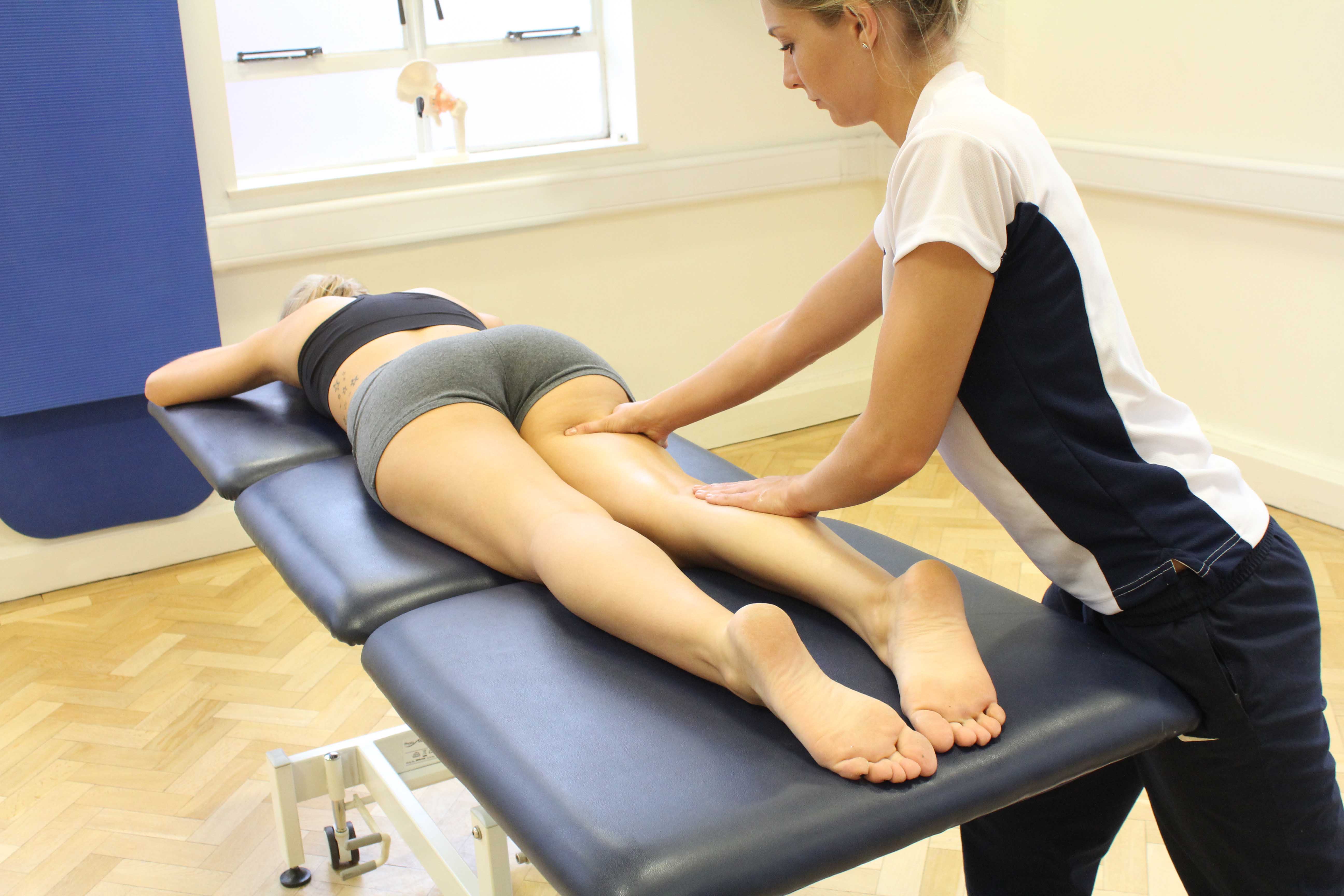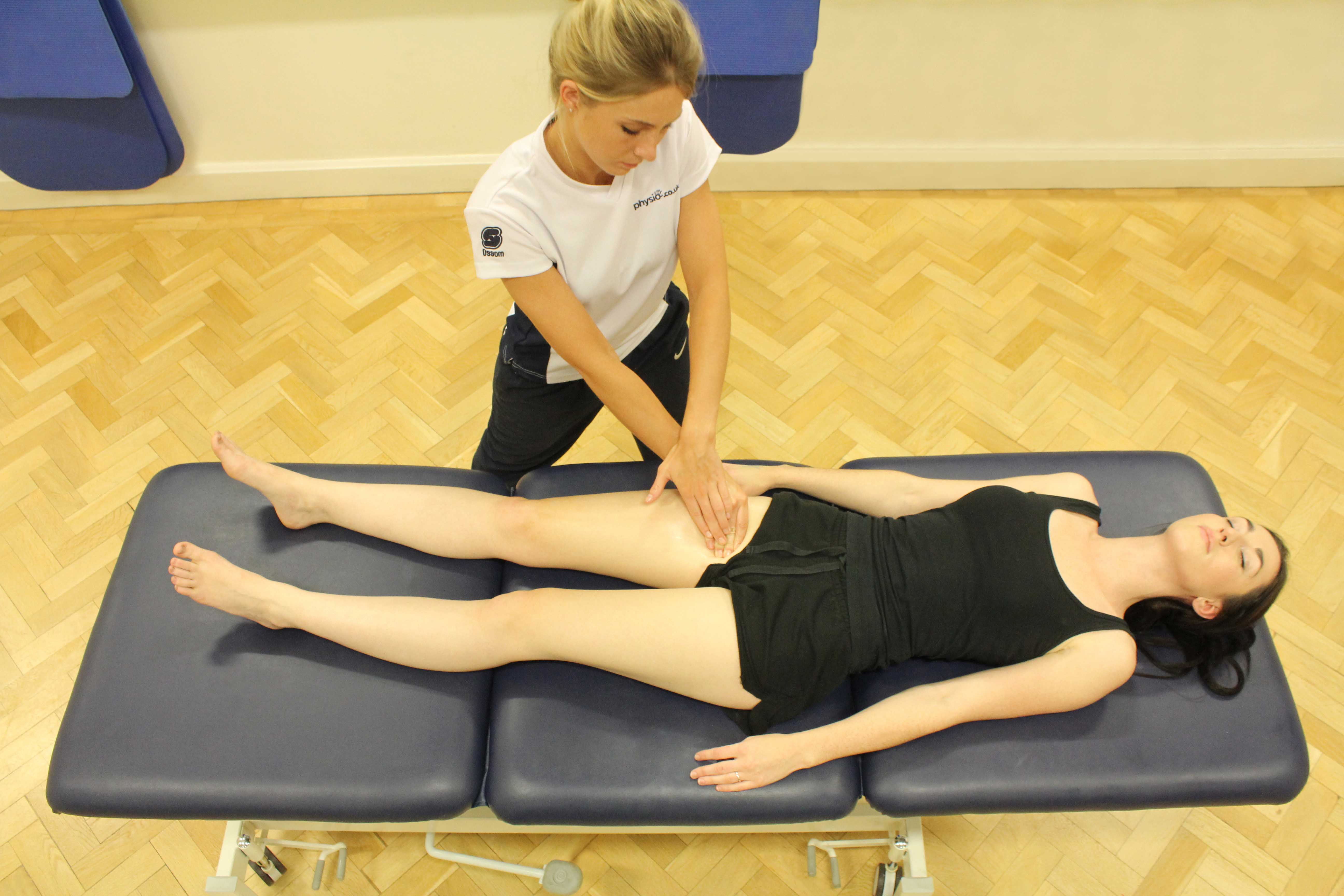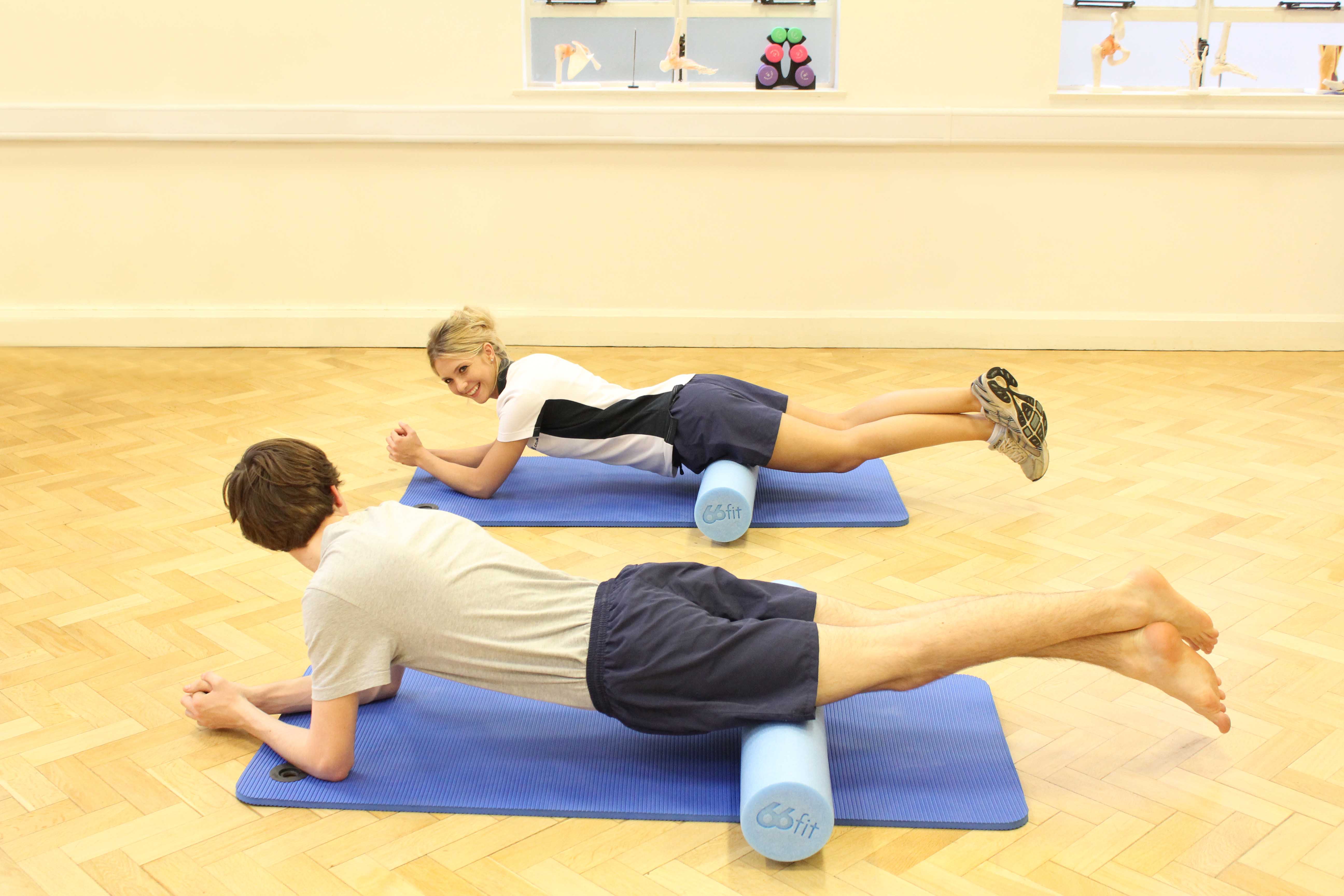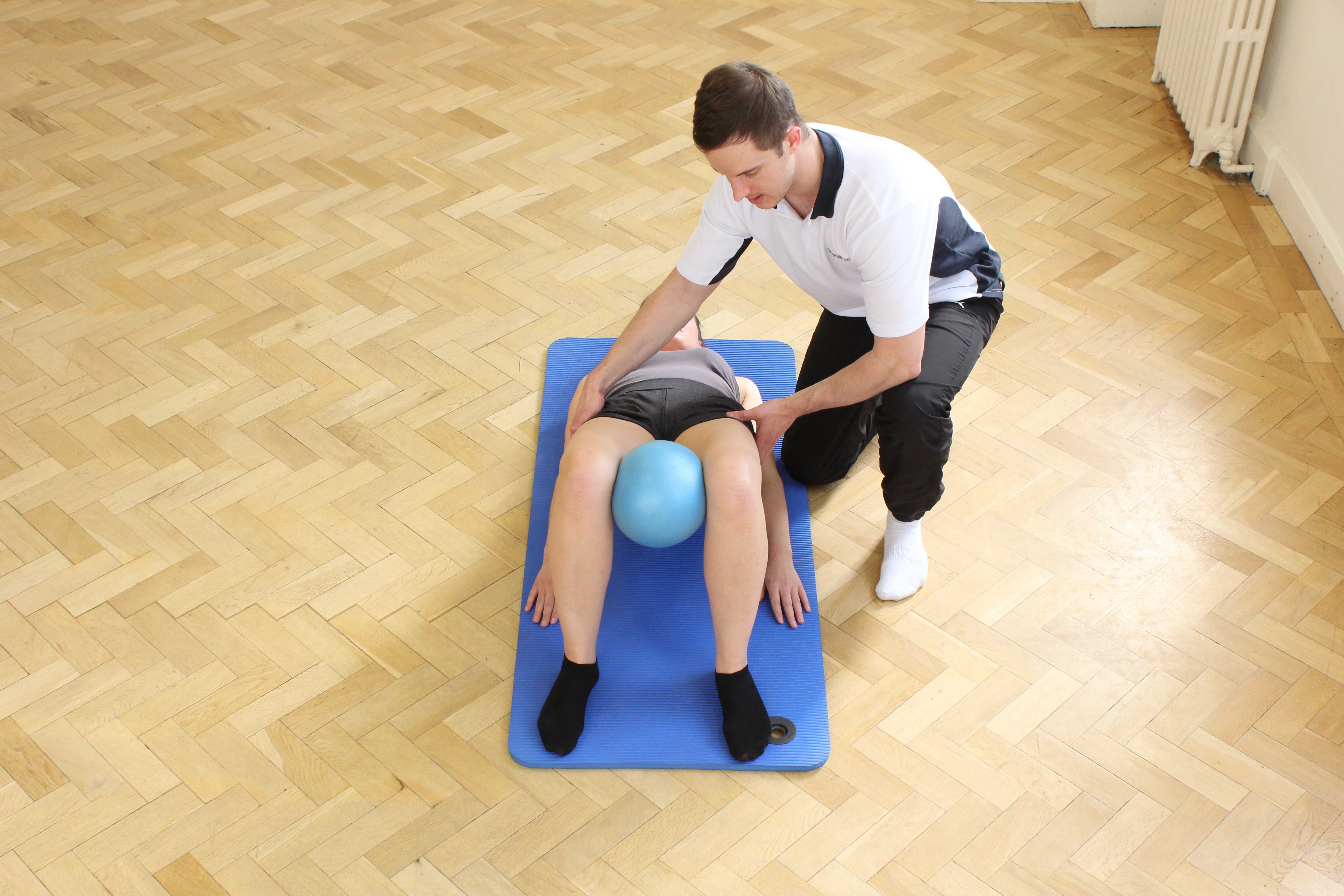Adductor Tenotomy Surgery
Your adductors are a group of muscles which lie on the inside of your femur (leg bone) which move your leg inwards across your body. They originate from your pubic bone which lies at the inferior pole (bottom) of your pelvis connecting the two sides of your pelvis anteriorly. Your adductors then migrate along the inside of your leg inserting at various point along your femur and tibia. The adductor muscles consist of:
- Pectineus
- Adductor Brevis
- Adductor Longus
- Adductor Magnus and
- Gracilis
 Above: Soft tissue massage of the muscles and connective tissues around the hip and groin
Above: Soft tissue massage of the muscles and connective tissues around the hip and groinAdductor tenotomy, or surgical release, is performed on any of your adductor muscles which are prone to recurrent tears or suffer from contractures which increase the tension on your pelvis.Adductor release involves cutting the tendon off the bone which relieves this tension on your pubic bone, helping to relieve the associated pain and disability. This increase in tension can alter your hip mechanics, creating muscular imbalances, and predispose to hernia repair (often performed in conjunction). Your adductors can also avulse (tear off the bone) from their origin which again needs surgical reattachment.This can be caused through a number of factors for example direct trauma or adductor tendinitis.
 Above: Soft tissue massage of the muscles and connective tissues around the groin
Above: Soft tissue massage of the muscles and connective tissues around the groinPhysiotherapy prior to Adductor Tenotomy Surgery
Physiotherapy prior to adductor tenotomy surgery can help to manage your symptoms and help you to function to the best of your ability. Also, physiotherapy will provide an optimal platform for post surgical rehab by preventing associated injuries and preparing your body for rehabilitation both of which will help to reduce your rehab period. Physio.co.uk provides thorough assessments of your lower limb and trunk highlighting deficiencies and weaknesses. We then develop a comprehensive rehabilitation programme directed by these problematic areas and your personal goals. Treatment will include:
- Cryotherapy
- Pain management
- Taping and bracing
- Soft tissue release
- Core strengthening
- Lower limb strengthening programme
- Stretching
- Electrotherapy
- Home exercise programme
- Advice on surgery and post surgical management
Symptoms following Adductor Tenotomy Surgery
Following adductor tenotomy you will commonly experience symptoms such as:
- Pain
- Swelling
- Bruising
Physiotherapy following Adductor Tenotomy Surgery
Following adductor tenotomy your movement will be limited in order to protect the repair and optimise recovery. Physiotherapy with Physio.co.uk will consist of a detailed examination and the development of a thorough rehabilitation programme based on your personal needs and goals. Core stability training plays an important role in preventing injuries acting as the foundation to movement providing stability and absorbing the tensile strength exerted through your muscles during activities and as such will form an integral part of your rehabilitation.
 Above: Active stretches and mobilisations of the groin and pelvic muscles with supervision from a MSK therapist
Above: Active stretches and mobilisations of the groin and pelvic muscles with supervision from a MSK therapistWeek 1
Initial treatment will be on managing acute post operative symptoms, the management of swelling and the retraining of your core stability. Your progress will be limited through pain and the surgical protocol followed. Treatment will include:
- Cryotherapy
- Pain management
- Soft tissue release
- Retraining core stability
- Basic core stability exercises
- stretches
- Active and passive movement within pain barriers
Week 2
After 1 week of physiotherapy, Physio.co.uk will step advance your rehab to include more functional based activities which place a higher strain on your muscles. Focus will be on preventing secondary injuries and the integration of intermediate strength work. Treatment will include
- Intermediate core stability strengthening
- Gentle return to activity – jogging, straight line running
- Light abdominal strengthening
- Light adductor strengthening
- Pelvic stability training
Week 3
Physio.co.uk will continue to adapt your physiotherapy programme to your specific needs and personal progress. Further strengthening will follow as well as higher level core stability strengthening for the prevention of re-injury. Treatment will include:
- Advanced core stability strengthening
- Further strengthening of adductors and abdominals
- Soft tissue release
- Open chain exercises
Week 4+
From week 4 your rehab will be intensified to ensure a timely return to sporting and functional activity. Sport specific training will be integrated as well as high level adductor and core stability training. Recovery can be as soon as 5 weeks, however this can be extended depending on the extent of surgery and rehabilitation progress. Treatment will include:
- Advanced core stability training
- Advanced pelvic stability training
- Advanced adductor strengthening
- Plyometrics
- Proprioceptive neuromuscular facilitation (PNF)
- Return to sporting activity – running, sprinting, twisting
 Above: Strengthening exercises for the hip and pelvic muscles, supervised by MSK therapist
Above: Strengthening exercises for the hip and pelvic muscles, supervised by MSK therapistSummary
Adductor tenotomy is a surgical procedure performed when your adductor muscles becomes contracted and shortened, increasing the tension in the muscle and on the bone, which cannot be released through conservative methods. Your adductor muscle is released through excision (cutting) of your muscle tendon at its insertion on your pubic bone relieving this tension and pain. Following surgery, physiotherapy is an important component of rehabilitation which helps to restore movement, strength, control, function and muscle integrity. Physio.co.uk will provide a thorough assessment and comprehensive rehabilitation programme to ensure the effective return to your previous level of activity. Call Physio.co.uk now on 0330 088 7800 for more information or to book an appointment please contact us.

 0330 088 7800
0330 088 7800

































